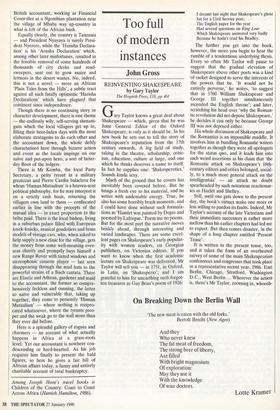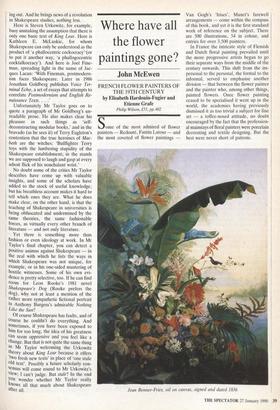Too full of modern instances
John Gross
REINVENTING SHAKESPEARE by Gary Taylor
The Hagarth Press, £18, pp, 461
Gary Taylor knows a great deal about Shakespeare — which, given that he was Joint General Editor of the Oxford Shakespeare, is only as it should be. In his new book he sets out to tell the story of Shakespeare's reputation from the 17th century onwards. A big field of study, taking in the theatre, scholarship, critic- ism, education, culture at large, and one which he thinks deserves a name to itself. In fact he supplies one: 'Shakesperotics,' Sounds kinda sexy.
Much of the ground that he covers has inevitably been covered before. But he brings a fresh eye to his material, and he writes with undeniable energy. True, he also has some horribly brash moments, and I could have done without such formula- tions as 'Hamlet was painted by Degas and poemed by Laforgue.' Poem me no poems. But for the most part the narrative moves briskly ahead, through interesting and varied landscapes. There are some excel- lent pages on Shakespeare's early popular- ity with women readers, on Georgian publishers, on Victorian editors. If you want to know when the first academic lecture on Shakespeare was delivered, Mr Taylor will tell you — in 1751, in Oxford, in Latin, on 'Shakesperio'; and I am grateful to him for unearthing such forgot- ten treasures as Guy Boas's poem of 1926: I dreamt last night that Shakespeare's ghost Sat for a Civil Service post;
The English paper for the year Had several questions on King Lear Which Shakespeare answered very badly Because he hadn't read his Bradley.
The further you get into the book, however, the more you begin to hear the rumble of a tendentious underlying thesis. Every so often Mr Taylor will pause to suggest that the gradual elevation of Shakespeare above other poets was a kind of racket designed to serve the interests of the powers that be. `It would not be entirely perverse,' he writes, `to suggest that in 1760 Williim Shakespeare and George III together simultaneously ascended the English throne'; and later, scratching his head over 'why the Roman- tic revolution did not depose Shakespeare,' he decides it can only be because George III was not deposed either.
His whole discussion of Shakespeare and the Romantics is an impossible muddle, It involves him in buridling Romantic writers together as though they were all apologists for the status quo, and it leads him into such weird assertions as his claim that `the Romantic attack on Shakespeare's 18th- century editors and critics belonged, social- ly, to a much more general attack on the intelligentsia' — an attack no doubt spearheaded by such notorious reactionar- ies as Hazlitt and Shelley.
Still, until one gets down to the present day, the book's virtues make one more or less willing to pardon its faults. Indeed, Mr Taylor's account of the late Victorians and their immediate successors is rather more mellow than his earlier chapters had led me to expect. But then comes disaster, in the shape of a long chapter entitled 'Present Tense'.
It is written in the present tense, too, and it takes the form of an overheated survey of some of the main Shakespearian conferences and congresses that took place in a representative recent year, 1986. East Berlin, Chicago, Stratford, Washington D.C., West Berlin... Wherever the action is, there's Mr Taylor, zooming in, whoosh- ing out. And he brings news of a revolution in Shakespeare studies, nothing less.
Here is Steven Urkowitz, for example, busy unmaking the assumption that there is only one basic text of King Lear. Here is Kathleen E. McLuskie, for whom Shakespeare can only be understood as the product of 'a phallocentric cockocracy'•(or to put it another way, 'a phallogocentric cocktalkocracy'). And here is Joel Fine-• man, spreading light in the name of Jac- ques Lacan: 'With Fineman, postmodern- ism faces Shakespeare. Later in 1986 Jonathan Goldberg publishes Voice Ter- minal Echo, a set of essays that attempts to correlate Postmodernism and English Re- naissance Texts. . .
Unfortunately Mr Taylor goes on to quote a paragraph of Mr Goldberg's un- readable prose. He also makes clear his pleasure in such things as 'self- deconstructing modular books,' and in the bravado (as he sees it) of Terry Eagleton's contention that the true heroines of Mac- beth are the witches: 'Bullfighter Terry toys with the lumbering stupidity of the Shakespeare establishment; in the stands we are supposed to laugh and gasp at every adroit flick of his nonchalant wrist.'
No doubt some of the critics Mr Taylor describes have come up with valuable insights, and some of the scholars have added to the stock of useful knowledge; but his breathless account makes it hard to tell which ones they are. What he does make clear, on the other hand, is that the teaching of Shakespeare in universities is being obfuscated and undermined by the same theories, the same fashionable forces, as virtually every other branch of literature — and not only literature.
Yet there is something more than fashion or even ideology at work. In Mr Taylor's final chapter, you can detect a positive animus against Shakespeare — in the zeal with which he lists the ways in Which Shakespeare was not unique, for example, or in his one-sided mustering of hostile witnesses. Some of his own evi- dence is pretty selective, too. If he can find room for Leon Rooke's 1981 novel Shakespeare's Dog (Rooke prefers the dog), why not at least a mention of the rather more sympathetic fictional portrait in Anthony Burgess's admirable Nothing Like the Sun?
Of course Shakespeare has faults, and of course he couldn't do everything. And sometimes, if you have been exposed to him for too long, the idea of his greatness can seem oppressive and you feel like a Change. But that is not quite the same thing as Mr Taylor welcoming the Urkowitz theory about King Lear because it offers two fresh new texts' in place of 'one stale old text'. Possibly a future scholarly con- sensus will come round to Mr Urkowitz's view; I can't judge. But stale? In the end You wonder whether Mr Taylor really knows all that much about Shakespeare after all.



























































 Previous page
Previous page